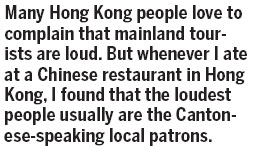Bias in bad habits' blame game
Updated: 2013-06-15 07:45
By Hong Liang(China Daily)
|
|||||||

On a visit to London not too long ago, I had lunch with my daughter at a restaurant in her neighborhood which was more chic than posh. While I was eagerly telling her how I have been doing since she left Hong Kong, she suddenly interrupted me and, in all seriousness, said: "Dad, could you please lower your voice. It's embarrassing."
Right at that moment, I realized that I was a typical rude, loud-mouthed Hong Kong tourist in the eye of the locals. Since then, I have become much more tolerant toward the supposed "rude" behavior of some mainland tourists. They are simply behaving in the same way they do at home.
In a South China Morning Post story, Yong Chen, a tourism expert at Hong Kong Polytechnic University, was quoted as saying: most "bad" (mainland) tourists don't intend to be "bad" or "tourist," they are just being themselves - they are being (mainland) Chinese."
I am sure many Hong Kong people could understand that because they, like me, must have embarrassed themselves at least once as a visitor in a foreign country by acting like they used to at home. But that didn't seem to have watered down the bias against mainland tourists.
The bias against mainland tourists was seen to be responsible for the rise in negative feelings toward Beijing and the mainland Chinese in general, as reflected in a recent survey by the Public Opinion Programme of the University of Hong Kong. Results of the survey showed that the number of Hong Kong people with such a feeling has risen by about 40 percent since November 2012.
Really, Hong Kong people should loosen up and take a good look at their habits before judging others too harshly. I had neighbors who talked so loudly at home that I could hear them in my apartment even with the windows closed. Taking a leisurely walk anywhere other than the deserted trails in the country parks is practically impossible. There are always people trying to push you out of the way from behind.
The rudest pests must be the mahjong addicts who love to indulge in noisy marathon games playing well into the night with no regard for their neighbors' need for sleep. I stayed at my friend's apartment in a decidedly upper-middle class neighborhood when I was back in Hong Kong during the Lunar New Year holiday. The upstairs neighbor played mahjong non-stop for two days and nights. Yes, I could hear them.
Many Hong Kong people love to complain that mainland tourists are loud. But whenever I ate at a Chinese restaurant in Hong Kong, I found that the loudest people usually are the Cantonese-speaking local patrons. They practically shout at each other and make everyone else in the vicinity aware of their conversations. There is really no small talk in a typical Hong Kong teahouse. Believe me, the noise pollution is all domestically generated.
When I go to Hong Kong, I am a tourist too. I do quite a bit of shopping in the busy commercial districts favored by other tourists, particularly those from the mainland. I don't find the crowd of mainland tourists particularly rude or loud. The younger among them are actually much more polite and well-behaved than many of their local counterparts.
I experienced rudeness once at an Apple store in Central where the majority of the customers seemed to be mainland tourists. The perpetrator was not one of them but a saleswoman at the store who kept distracting the salesman who was handling my purchase while a long line of other customers were waiting in line.
In Hong Kong, with people who, like this Apple saleswoman, are supposed to be courteous and considerate by training, behaving so inconsiderately, we really shouldn't be pointing fingers at others all the time.
The author is a veteran current affairs commentator.
(China Daily 06/15/2013 page4)